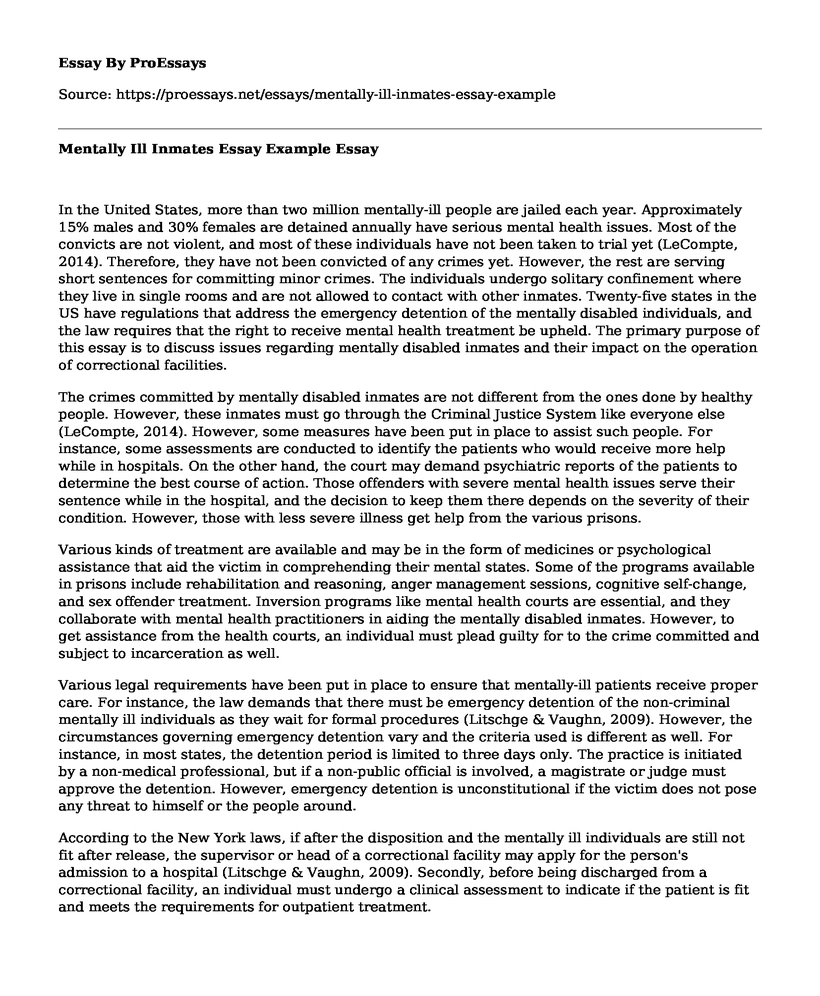In the United States, more than two million mentally-ill people are jailed each year. Approximately 15% males and 30% females are detained annually have serious mental health issues. Most of the convicts are not violent, and most of these individuals have not been taken to trial yet (LeCompte, 2014). Therefore, they have not been convicted of any crimes yet. However, the rest are serving short sentences for committing minor crimes. The individuals undergo solitary confinement where they live in single rooms and are not allowed to contact with other inmates. Twenty-five states in the US have regulations that address the emergency detention of the mentally disabled individuals, and the law requires that the right to receive mental health treatment be upheld. The primary purpose of this essay is to discuss issues regarding mentally disabled inmates and their impact on the operation of correctional facilities.
The crimes committed by mentally disabled inmates are not different from the ones done by healthy people. However, these inmates must go through the Criminal Justice System like everyone else (LeCompte, 2014). However, some measures have been put in place to assist such people. For instance, some assessments are conducted to identify the patients who would receive more help while in hospitals. On the other hand, the court may demand psychiatric reports of the patients to determine the best course of action. Those offenders with severe mental health issues serve their sentence while in the hospital, and the decision to keep them there depends on the severity of their condition. However, those with less severe illness get help from the various prisons.
Various kinds of treatment are available and may be in the form of medicines or psychological assistance that aid the victim in comprehending their mental states. Some of the programs available in prisons include rehabilitation and reasoning, anger management sessions, cognitive self-change, and sex offender treatment. Inversion programs like mental health courts are essential, and they collaborate with mental health practitioners in aiding the mentally disabled inmates. However, to get assistance from the health courts, an individual must plead guilty for to the crime committed and subject to incarceration as well.
Various legal requirements have been put in place to ensure that mentally-ill patients receive proper care. For instance, the law demands that there must be emergency detention of the non-criminal mentally ill individuals as they wait for formal procedures (Litschge & Vaughn, 2009). However, the circumstances governing emergency detention vary and the criteria used is different as well. For instance, in most states, the detention period is limited to three days only. The practice is initiated by a non-medical professional, but if a non-public official is involved, a magistrate or judge must approve the detention. However, emergency detention is unconstitutional if the victim does not pose any threat to himself or the people around.
According to the New York laws, if after the disposition and the mentally ill individuals are still not fit after release, the supervisor or head of a correctional facility may apply for the person's admission to a hospital (Litschge & Vaughn, 2009). Secondly, before being discharged from a correctional facility, an individual must undergo a clinical assessment to indicate if the patient is fit and meets the requirements for outpatient treatment.
Conclusion
In conclusion, many convicts in the United States are mentally disabled, and some procedures have been put in place by the law regarding the treatments of these convicts. The crimes committed by these individuals are not different from the ones committed by mentally healthy inmates. Many states in the US have programs in the prisons to assist the patients while severe cases are treated in hospitals. After serving their sentence, mentally ill patients must undergo a clinical assessment to determine their mental health status and help is given to those who need it.
References
LeCompte, J. D. (2014). When Cruel Become the Usual: The Mistreatment of Mentally Ill Inmates in South Carolina Prisons. SCL Rev., 66, 751.
Litschge, C. M., & Vaughn, M. G. (2009). The Mentally Ill Offender Treatment and Crime Reduction Act of 2004: problems and prospects. Journal of Forensic Psychiatry & Psychology, 20(4), 542-558. doi:10.1080/14789940802434675
Cite this page
Mentally Ill Inmates Essay Example. (2022, Oct 05). Retrieved from https://proessays.net/essays/mentally-ill-inmates-essay-example
If you are the original author of this essay and no longer wish to have it published on the ProEssays website, please click below to request its removal:
- Simulant Medication and Patients Without Mental Health Problems
- Research Paper on Federal Bureau of Investigation
- Paper Example on Types of Witnesses
- Proposal for the Use of Stab Resistant Vest in the Prison Paper Example
- Essay Example on Re-Evaluate Goals for Personal Change Success
- Finding Happiness: Achieving Balance Between Positive and Negative Emotions - Essay Sample
- Essay Example on Nurse Burnout: Effects on Patient Outcomes







